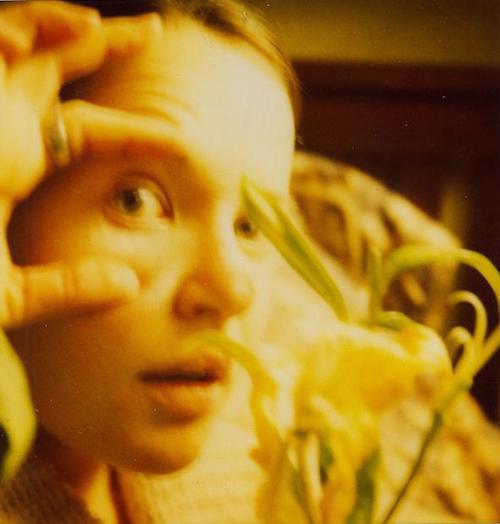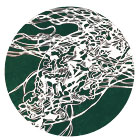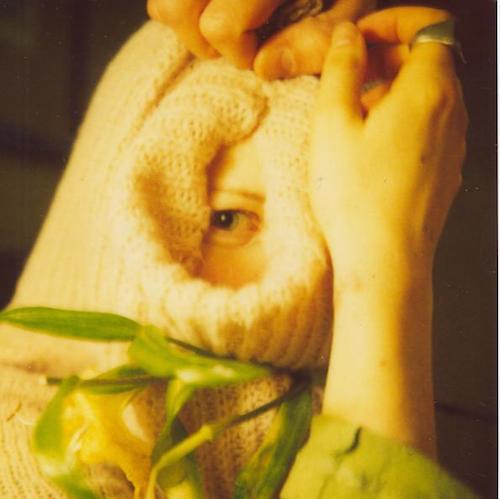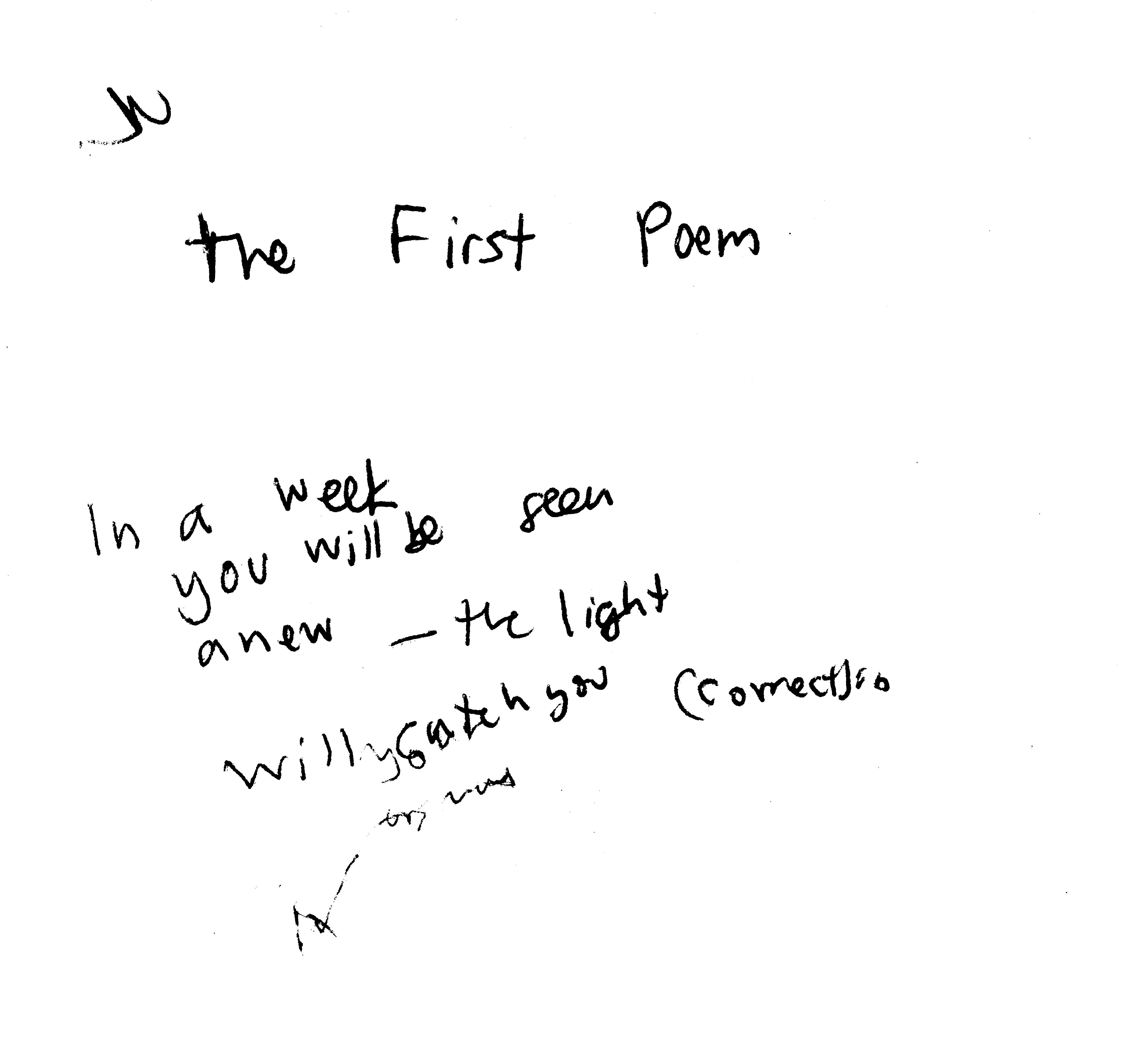Notes for National Corpse Month, Part Four

During the plague, my tour-book described, this cemetery (the only one within the city walls) was so full of bodies that when they dug, they couldn’t find enough soil to bury new corpses. The ground swelled with every interment.
—Greta Wrolstad, Triptych (Edinburgh)
Every corpse is a sphinx of immortality.
—Hans Christian Andersen, The Galoshes of Fortune

My friend Greta died ten years ago. She died the summer between our first and second years in graduate school (University of Montana). She was twenty-four, and a poet. I was twenty-six. I turned twenty-seven the morning after she was hospitalized.
She was on her way to the Blackfoot River with a friend. They were turning left towards the river. The cars behind them were honking—Don’t go, Don’t go!—because a car was coming fast from the other direction, but honking often sounds like—Hurry up, Hurry up!—so they hesitated and went. Greta was in the passenger seat. It was Friday, August 5, 2005. She was in the hospital for five days. On the fifth day, Tuesday, August 9, she died.
Greta’s friend, who was driving, was thrown from the driver’s seat into the back of the car. She was in the hospital for a month. She slowly began to remember. She remembered opening her eyes and seeing Greta still sitting in the passenger seat. She remembered opening her eyes and seeing Greta and Greta was still breathing, she could hear Greta breathing, but her breathing was different, in my mind it was bubbles.

My mind is thrown repeatedly into the sky. I envision Greta above the trees. There is no hospital, at first, only the point of impact. I can’t get beyond the moment immediately before, which is daylight and mindlessness—life. I envision a subtle change in the light, which comes with knowing what happened next. Then Greta's breath rises off the road, inhales the moisture out of the clouds. There is no river, even ...
Then the hospital comes into view. Not the hospital, but a single room on the fourth or third story. The third story is empty. The floor is reflective—a dark mirror. The sky through the window spreads through the floor—a knowing, omniscient, yet helpless infinity. The sound of cicadas is thin—recessed, a margin. The room has the temperature of a cave, or an oven left to cool for a century. The room is unlit; it is late afternoon on the floor and the ceiling. The room isn't spotless because it is clean, but because it is new, every day ...
Greta is sleeping upright in a bed, surrounded by soundless machines. Once there, everything about her breaks up ...
I don’t want to write anymore. I remember everything ...
In fragments ...

“The corpse was handsome,”
“sapphire-eyed” “Young” “& still alive”
—Alice Notley, The Descent of Alette

Before she died, Greta's parents invited a few of us to see her.
I declined.
I stood in a hallway of the hospital with a friend who said,
She’s blue, but still looks like herself.

The last time I saw Greta was Thursday (she died the following Tuesday). She was wearing a white t-shirt and standing in a doorway. She was passing through the doorway into a hall ...

My sister took a picture of our grandmother standing in a doorway and gave it to our father for his birthday. I gave him Japanese Death Poems—an anthology of poems written by poets and monks and samurai before dying, often by suicide. His wife tore up the poems and hid my sister’s photo in a box. Death omens, she said. Pictures of people standing in doorways are death omens. She believed we were suggesting that we wanted her and our father to die. When a person stands on a threshold, she believed, people believe, they are interrupting the barrier between worlds, through which hungry and wandering ghosts penetrate. The one on the threshold becomes permeable; it's the living on the inside who are scared.

The corpse that comes first to mind is the corpse I have not seen:
For the first few years after Greta died, I saw her everywhere. In several states, several countries, always in a crowd—always walking, always alone.
She’s hiding, I thought—She faked her death!
I’ve never told this to anyone.
I knew it was not Greta, but her vision came upon me like violence. I was scared she would see me, but I was nobody. I was alien against the energy of her sudden appearance, while completely outside her ongoing death. These Greta’s were strangers, unwittingly wearing the mask of a young woman who died years ago.
But the mask was real ...
I felt like an air-headed flower, trying to stretch my whole self to the sun.
And yet, I avoided it's gaze ...
The masked strangers embodied the time between when I last saw Greta (Thursday) and when I declined seeing her (she still looks like herself). But my inability to say Yes to her face manifested a universe of likenesses, because where did it go?
I watched solemn yet electric colors flash against rows of dark trees before disappearing into masses of indifferent heads. I accounted for Greta's change in appearance to age, though ultimately I had forgotten ...
In the streets, in the park, I thought,
This must be death.

Say my face is familiar,
you strangers on the cobblestones: her blood was in your body, a blood clot went to her brain.
—Greta Wrolstad, Advent
The unseen gets into the thick of my body, disrupting, and I am
weakened, once more made quiet.
—Greta Wrolstad, from St. Petersburg (June 20, 2005, 9:56 pm)

Greta revised her poems "Advent" and "Triptych" on July 13, four weeks before she died. She revised a series of nineteen "St. Petersburg" poems—originally written in June, in St. Petersburg—on July 17. She revised her poem “The Clearing” (A Public Space, Issue 04, Summer 2007) on August 2. A typewritten draft of her poem “Siphon & Thrush” was on the floor of her apartment. "Siphon & Thrush," "Advent," and her St. Petersburg poem beginning, "The unseen gets into the thick of my body," are in Night is Simply a Shadow, a collection of Greta's poems published by Tavern Books in 2013.
The circles separating the sections of this post are illustrations made by Cecilia Yang, for Notes on Sea & Shore, a poem published as a chapbook, also by Tavern Books.

I got the keys to her apartment from her landlord. I went in alone.
A potted plant sat in the sink. A cast-iron skillet needed cleaning. The only thing that moved was the red number blinking on her answering machine.
Greta had been talking about mounting a roll of butcher paper on the wall. The idea came through her readings of Mallarmé's Un Coup de Dés and Olson's "Projective Verse" and a review she was writing on Sandra Miller's (now Doller's) Oriflamme (the review was published posthumously in Word for/Word). The wall was empty, but I saw the butcher paper hanging to the floor, curled at the bottom.
I went through Greta's papers and shelves and desk drawers and computer looking for her poems, I don't know why, like her apartment was on fire. I wanted to save them, but from what? The apartment was silent, serene. More likely a wind would blow through. The plant was very hopeful in the sink. I vomited once off the side of the porch (earlier that year), and was taken to the hospital in an ambulance. The trees were black, but now I was alone in Greta's apartment, wondering, have I been here before? I thought of her head filled with the river. She was almost there, she was thinking, and the river kept coming.

Fetching a corpse from the river
people leave it
at the ghats
and say—
Here lies Time
—Shrikant Verma, Magadh
(translated from the Hindi by Rahul Soni)
Then suddenly all is nothingness,
Only an exposed corpse,
On the naked arm of Time
—Lan Ling, Beyond Silence

Incidentally, in classical Japanese poetry (waka), sometimes poets used the image of an empty cicada shell as a metaphor for a person living in this world—a person who is not dead yet, but who will eventually become an empty shell upon death, a living corpse in other words. The reason is that the word utsusemi (literally "empty cicada") includes the homophonic words utsu meaning "the present" and mi (body).
—Jeffrey Angles, via email, March 24, 2015, Re: Do you have corpses in your poems?

As if creating cairns, we stack
The corpses of cicadas
—Tada Chimako, Boys of Summer
(translated from the Japanese by Jeffrey Angles)

Then I was afraid: did removing Greta's poems from her apartment hasten her death? I was afraid I upset a balance. Because: sometimes I think a poet cannot coexist with her poems—that everything up to the moment when the poet dies is preparation for the poems' free existence. But I hastened their separation.
Late afternoon guttered out on the ceiling.
Why did the butcher paper taste like salt? What number was blinking on the machine? What kind of plant was in the sink? Where is it now? What has it become?
Going into Greta's apartment was my way of visiting her in her hospital room. Removing her poems both made and displaced the altar. I made copies and passed them around, as if to say, She's not dead!—and in that my guilt spread like a stain. Greta's body was dying, but she was still in her body.

Remember the lily, growing through
the heart of the corpse?
—Brenda Hillman, Death Tractates
what is it that cannot be hidden, what is visible now?
—corpse—
a parting gift
—Piyush Daiya, Father
(translated from the Hindi by Rahul Soni)

What part of a person becomes a poem ...
The intelligence, the spirit, the body, the humors?
What part of a person disappears into a poem?
What part of a person does not?
What part of a person disappears into a corpse ...
The intelligence, the spirit, the body, the humors?
What part of a person does not?
Can a poet get stuck in her poems, in her corpse?
To re-live the same revelations over and over ...
Until the poems and the corpse rut ...
And become heavy with extravagant nightmare ...
To re-turn the poet to the ancient (primary) state of consciousness ...
Encompassing the veiled meanings of life and/or death without thought?

A poem placed on a corpse softens like the skin of spring. The spring is sidereal, stars. I mispronounced sidereal in front of Greta once. It was in a house where the above and below photographs—taken at the Ramada Inn in downtown Vancouver, April 2005—were projected, one month after Greta died, on the wall. She said to me once, It's okay to be ambiguous, but you have to be clear!

She was right. I am not being ...
I am repeating ...
Everything I have written here, everything I am writing ...
I have tried to write ...
Innumerable times ...
Without trailing off ...
I find myself lost in several indefinite places at once ...
Always just having missed ...
I lodge in memories that continually swallow themselves. The details, altered and eroded by time, have unfolded an inherent shadow-poem that often feels like the equivalent of hell. I wrote about the last time we hung out (we ate Pink Ladies, then grilled cheese sandwiches at a bar, 10 a.m.—it was Wednesday) for a memorial service in Missoula. I retold parts of that story when her book came out. She's embedded in my poetry: she's on page 54 of The Girl Without Arms, 55 of O Bon, and 123 of The Alps ...
But do I recognize her?

The corpse becomes a kind of sphinx—that decays and disappears within the worshipful revolutions of the bodies and minds of the living, who try desperately to formulate some kind of answer, but can only offer destitute guesses. The guesses agonize in the form of images. The images—bereft yet sustaining and unrelieved truths—dilate and decompose. Still the living are lured repeatedly to the face, within which is felt their own transformation.

The first thing I wrote after Greta died was a few negligible scratches in my notebook. It was later that month, August 2005. And yet, despite the passage of time, and my ongoing contemplation of poetry and friendship, poetry and disappearance, poetry and corpses, and poetry and death, these scratches still feel both like the beginning and about as far as I've gotten:

Brandon Shimoda (he/him) is the author of several books of poetry and prose, including The Grave on ...
Read Full Biography

